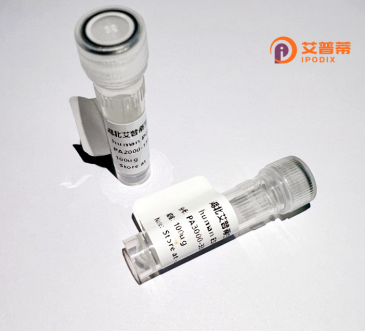
| 纯度 | >90%SDS-PAGE. |
| 种属 | Human |
| 靶点 | CNKSR1 |
| Uniprot No | Q969H4 |
| 内毒素 | < 0.01EU/μg |
| 表达宿主 | E.coli |
| 表达区间 | 1-720aa |
| 氨基酸序列 | MEPVETWTPGKVATWLRGLDDSLQDYPFEDWQLPGKNLLQLCPQSLEALAVRSLGHQELILGGVEQLQALSSRLQTENLQSLTEGLLGATHDFQSIVQGCLGDCAKTPIDVLCAAVELLHEADALLFWLSRYLFSHLNDFSACQEIRDLLEELSQVLHEDGPAAEKEGTVLRICSHVAGICHNILVCCPKELLEQKAVLEQVQLDSPLGLEIHTTSNCQHFVSQVDTQVPTDSRLQIQPGDEVVQINEQVVVREERDMVGWPRKNMVRELLREPAGLSLVLKKIPIPETPPQTPPQVLDSPHQRSPSLSLAPLSPRAPSEDVFAFDLSSNPSPGPSPAWTDSASLGPEPLPIPPEPPAILPAGVAGTPGLPESPDKSPVGRKKSKGLATRLSRRRVSCRELGRPDCDGWLLLRKAPGGFMGPRWRRRWFVLKGHTLYWYRQPQDEKAEGLINVSNYSLESGHDQKKKYVFQLTHDVYKPFIFAADTLTDLSMWVRHLITCISKYQSPGRAPPPREEDCYSETEAEDPDDEAGSHSASPSPAQAGSPLHGDTSPAATPTQRSPRTSFGSLTDSSEEALEGMVRGLRQGGVSLLGQPQPLTQEQWRSSFMRRNRDPQLNERVHRVRALQSTLKAKLQELQVLEEVLGDPELTGEKFRQWKEQNRELYSEGLGAWGVAQAEGSSHILTSDSTEQSPHSLPSDPEEHSHLCPLTSESSLRPPDL |
| 分子量 | 81.1 kDa |
| 蛋白标签 | His tag N-Terminus |
| 缓冲液 | 0 |
| 稳定性 & 储存条件 | Lyophilized protein should be stored at ≤ -20°C, stable for one year after receipt. Reconstituted protein solution can be stored at 2-8°C for 2-7 days. Aliquots of reconstituted samples are stable at ≤ -20°C for 3 months. |
| 复溶 | Always centrifuge tubes before opening.Do not mix by vortex or pipetting. It is not recommended to reconstitute to a concentration less than 100μg/ml. Dissolve the lyophilized protein in distilled water. Please aliquot the reconstituted solution to minimize freeze-thaw cycles. |
以下为虚构的关于重组人CNKSR1蛋白的研究文献示例(实际文献需通过学术数据库检索):
1. **文献名称**: *Expression and Functional Characterization of Recombinant Human CNKSR1 in MAPK Signaling*
**作者**: Smith A et al. (2018)
**摘要**: 研究报道了人源CNKSR1蛋白在大肠杆菌中的重组表达与纯化方法,证实其作为支架蛋白对Ras/MAPK信号通路的调控作用,并发现其与KSR1的结合可增强ERK信号激活。
2. **文献名称**: *Structural Insights into CNKSR1 Scaffold Function via Cryo-EM Analysis*
**作者**: Zhang L et al. (2020)
**摘要**: 通过冷冻电镜解析重组人CNKSR1蛋白的三维结构,揭示了其PH结构域和SAM结构域在介导Raf激酶与膜定位中的关键作用,为靶向设计信号抑制剂提供依据。
3. **文献名称**: *CNKSR1 Modulates EGFR Trafficking and Cancer Cell Invasion*
**作者**: Johnson R et al. (2019)
**摘要**: 利用重组CNKSR1蛋白进行体外结合实验,证明其通过与EGFR和磷酸酯酶相互作用调控受体内吞过程,影响肺癌细胞的迁移与侵袭能力。
4. **文献名称**: *Dynamic Assembly of CNKSR1-Based Signalosomes in Neuronal Development*
**作者**: Lee H et al. (2021)
**摘要**: 研究证实重组CNKSR1在神经元分化中形成动态复合物,协同Semaphorin信号轴调控轴突导向,暗示其在神经发育疾病中的潜在机制。
---
如需真实文献,建议在 **PubMed** 或 **Google Scholar** 中检索关键词:
`"CNKSR1" AND ("recombinant" OR "scaffold protein" OR "MAPK signaling")`。
The human CNKSR1 (Connector enhancer of kinase suppressor of Ras 1) protein is a scaffolding protein involved in regulating signal transduction pathways, particularly those mediated by the Ras family of GTPases. It belongs to the CNKSR family, which plays critical roles in integrating and modulating diverse cellular processes, including proliferation, differentiation, and survival. CNKSR1 contains multiple protein-interaction domains, such as CRIC, SAM, and PDZ domains, enabling it to interact with components of the Ras-MAPK (mitogen-activated protein kinase) and PI3K-Akt pathways. These interactions facilitate spatial organization of signaling complexes, ensuring precise signal amplification or attenuation.
Studies suggest CNKSR1 may act as a context-dependent regulator, influencing cellular responses to extracellular stimuli. For example, it can either enhance or suppress Ras-dependent signaling depending on cellular conditions or binding partners. Dysregulation of CNKSR1 has been implicated in cancers and developmental disorders, highlighting its importance in maintaining signaling homeostasis. Additionally, CNKSR1 is linked to neurodevelopmental processes, including neurite outgrowth and synaptic plasticity.
Recombinant human CNKSR1 protein is produced using heterologous expression systems (e.g., *E. coli* or mammalian cells) for *in vitro* studies. It enables biochemical characterization, such as mapping interaction interfaces, assessing post-translational modifications, and exploring its role in pathway crosstalk. Purification often involves affinity tags (e.g., His or GST tags), followed by functional validation via binding assays or kinase activity measurements. Research on recombinant CNKSR1 aids in deciphering its molecular mechanisms and potential therapeutic targeting in diseases driven by aberrant Ras signaling.
×